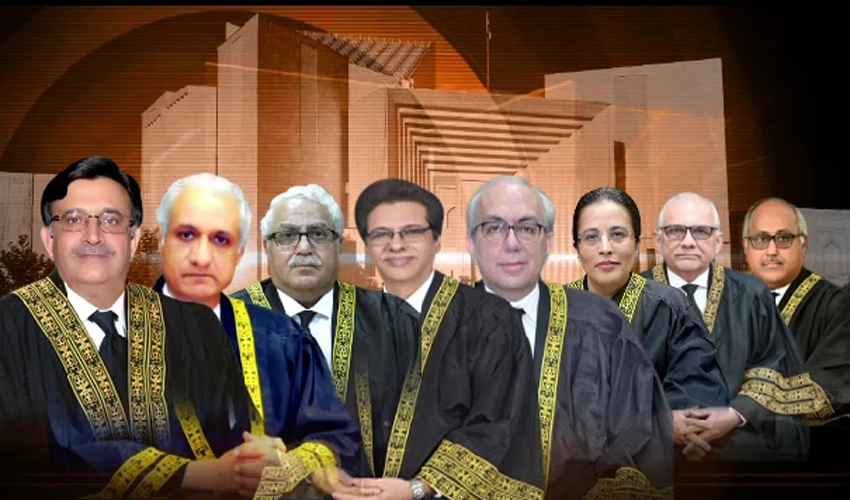SC issues notices to president, PM and Pakistan Bar Council in judicial reforms bill case

ISLAMABAD (92 News) - The Supreme Court eight-member larger bench issued notices to President Dr Arif Alvi, Prime Minister Shehbaz Sharif and the Pakistan Bar Council in the judicial reforms bill case on Thursday.
Hearing the applications against Supreme Court (Practice and Procedure) Bill, 2023, Chief Justice of Pakistan Umar Ata Bandial remarked that several questions have been raised about the independence of judiciary.
"We have utmost respect for the parliament. We will review in this case whether any violation has been done in the proposed legislation," he observed.
The eight-member bench includes Chief Justice Umar Ata Bandial, Justice Ejazul Ahsan, Justice Muneeb Akhtar, Justice Mazahar Ali Akbar Naqvi, Justice Muhammad Ali Mazhar, Justice Ayesha A Malik, Justice Syed Hassan Azhar Rizvi and Justice Shahid Waheed.
APP adds: According to the written order, notices were issued to the respondents in all three petitions. Notices were also issued to the AGP under O. 27A CPC, besides the Supreme Court Bar Association through its president and the Pakistan Bar Council through its vice chairman.
Notices were also issued to the following political parties who might, if they so desired, appear through duly instructed counsel: Pakistan Muslim League-N (PML-N), Pakistan Peoples Party Parliamentarians (PPPP), Pakistan Tehreek-e-Insaf (PTI), Jamiat Ulema-e-Islam (JUI), Jamaat e Islami (JI), Awami National Party (ANP), Muttahida Qaumi Movement (MQM), Balochistan Awami Party (BAP) and Pakistan Muslim League-Q (PML-Q).
The order said,”There are before the court three petitions under Article 184(3) of the Constitution. They challenge the constitutionality of federal legislation, being the Supreme Court (Practice and Procedure) Bill, 2023 (“Bill”). The Bill is on its way to becoming an Act of Parliament in terms of clause (3) of Article 75 of the Constitution. The legislation is assailed on various grounds.
“Imtiaz Rashid Siddiqui counsel submitted that the independence of the judiciary was a principle of fundamental constitutional importance, deeply grounded in the structures of the Constitution. It was an unassailable fundamental right.
“Referring in particular to the Supreme Court, learned counsel emphasized the centrality of the position of the Chief Justice of Pakistan to the court. Referring to the Bill itself learned counsel read out the various clauses thereof. It was submitted that in terms of the legislative process, with particular reference to Article 75(3), the Bill had travelled beyond the stage of being at the legislative stage. It had, rather, taken the position of a proposed Act that was bound to come into being with the efflux of time. Therefore, the Bill itself could be considered and the constitutionality or otherwise of its provisions examined by the court. The present petitions were maintainable and could not be faulted as premature.
“It was submitted that the passage of this legislation was defective at both the executive stage, when the Bill was conceived and approved by the Cabinet, and thereafter at the legislative stage in terms of its passage through the two Houses of Parliament and then, after its return by the President, its reconsideration in joint sitting. The reasons given by the President for returning the Bill were not properly considered. It was submitted that the legislation was a fraud on the Constitution.
“The counsel submitted, referring to clauses 2 to 4 of the Bill, that a basic objection to the constitutionality thereof was that it sought to displace the Chief Justice and place the powers that lay with him alone with another body, the committee sought to be set up in terms thereof. It was submitted that the rule making power of the court under Article 191 had been exercised and could not now be displaced by legislation of the sort contemplated. In this context learned counsel also referred to the power of each organ of the state, i.e., the legislative, executive and judicial branches, to exclusively regulate its own internal matters and procedures. “It was submitted that the Bill was an intrusion into a sphere made exclusive to the court and hence was ultra vires the Constitution. That field already stood occupied by the Supreme Court Rules, 1980 and therefore could not now be entered into upon by the legislature.
“As regards the appellate jurisdiction sought to be conferred on the court, learned counsel submitted that it was beyond the competence of Parliament to do so, either in terms of Article 191 or entry No. 55 of the Federal Legislative List.
“Learned counsel also prayed for interim relief by way of either the suspension of the Bill, or a direction to the President not to assent to it and/or an order to the Law Ministry not to notify the Act.
The next hearing of the case would be on May 2.”







